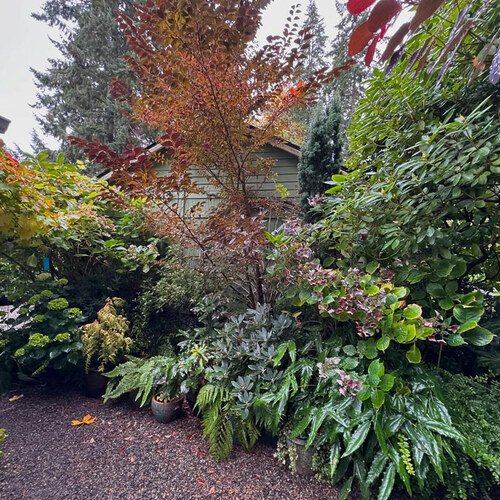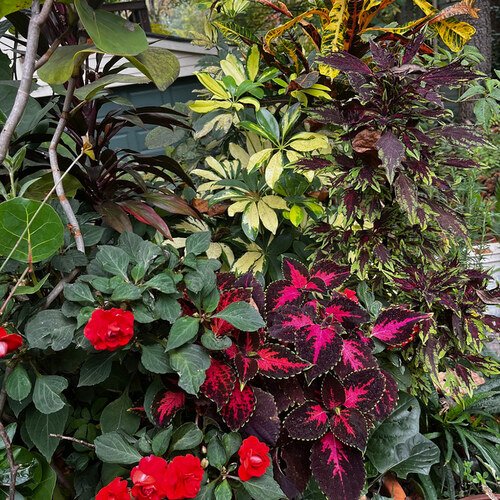
Jay Sifford is a renowned garden designer whose work has been featured in Fine Gardening magazine and on various social media platforms. His garden, Rhodwood, located in North Carolina, is a masterpiece of design and horticulture. With a focus on creating a four-season garden, Jay has incorporated a wide variety of plants, including conifers, grasses, and other foliage stars that come to life in the fall months.
The use of conifers in Jay’s garden is particularly striking, with trees of all shapes, sizes, and colors providing year-round structure, color, and texture. The fall foliage of these conifers, combined with other plants like hydrangeas, Japanese maples, and ornamental grasses, creates a kaleidoscopic display of colors and textures that is truly breathtaking.
One of the key design elements in Jay’s garden is the use of
In addition to plants, Jay also incorporates other elements like blown glass spears and sunken “tub gardens” filled with pitcher plants to add interest and whimsy to the garden. These unexpected touches create unique and memorable vignettes that surprise and delight visitors as they explore the space.
The use of
Overall, Jay Sifford’s garden is a testament to the power of design and the creative use of elements like
If you’re looking for inspiration for your own garden design, consider taking a page from Jay Sifford’s book and experimenting with the use of
Gardening is a beloved hobby for many people around the world. It allows us to connect with nature, create beauty, and cultivate life right in our own backyard. Whether you are a seasoned gardener with years of experience or a newbie just starting out, there is always something new to learn and discover in the world of gardening.
We’d love to hear where you are located, how long you’ve been gardening, successes you are proud of, failures you learned from, hopes for the future, favorite plants, or funny stories from your garden. Gardening is a deeply personal and rewarding experience, and each gardener has their own unique journey with plants, flowers, and vegetables.
Location plays a significant role in gardening, as different climates and soil types can affect the success of your garden. Whether you are in a temperate climate with mild winters and summers, or a more extreme climate with hot summers and cold winters, there are always ways to adapt and thrive as a gardener. Some locations may have specific challenges such as pests, diseases, or limited sunlight, but with the right knowledge and tools, any garden can flourish.
For many gardeners, the journey begins with a single plant or flower that sparks a love for gardening. Over time, as you gain experience and knowledge, you may find yourself expanding your garden and trying new plants and techniques. Successes in the garden can be as simple as a beautiful bloom or a bountiful harvest, but they are always a source of pride and joy for any gardener.
Of course, not every gardening endeavor is a success. Failures are a natural part of the process and can be valuable learning experiences. Whether it’s a plant that doesn’t thrive, a pest infestation, or an unexpected frost, failures in the garden teach us resilience, patience, and the importance of adaptation. Gardening is a constant learning process, and even the most experienced gardeners face challenges and setbacks.
As you reflect on your gardening journey, you may have hopes and dreams for the future of your garden. Perhaps you envision a lush and vibrant oasis filled with your favorite plants and flowers, or a productive vegetable garden that provides fresh produce for your family. Whatever your vision may be, the future of your garden is filled with endless possibilities and potential.
Speaking of favorite plants, every gardener has their own preferences when it comes to the plants they love to grow. Whether you have a green thumb for roses, a passion for tomatoes, or a collection of exotic succulents, your favorite plants reflect your unique personality and taste. Some gardeners are drawn to the beauty of flowers, while others enjoy the practicality of growing herbs and vegetables. Whatever plants bring you joy, they are an essential part of your gardening experience.
And let’s not forget the funny stories that often come with gardening. From unexpected encounters with wildlife to mishaps with garden tools, there are plenty of humorous moments that make gardening an entertaining and memorable experience. Whether it’s a mischievous squirrel raiding your bird feeder or a comical mishap while planting seeds, these funny stories add a touch of whimsy to the everyday tasks of tending to your garden.
In today’s digital age, sharing your gardening experiences with others has never been easier. Social media platforms like Facebook, Instagram, and Twitter allow you to connect with fellow gardeners, share photos of your garden, and exchange tips and advice. By using hashtags like #FineGardening, you can join a community of like-minded individuals who share your passion for plants and gardening.
If you receive the GPOD (Great Plant, Great Design) newsletter by email, you can stay updated on the latest gardening trends, tips, and inspiration. By signing up for the newsletter, you can access valuable resources and articles that will help you grow and enhance your garden.
As you continue on your gardening journey, remember that the beauty of gardening lies not only in the plants you grow, but in the connections you make with nature and with fellow gardeners. Whether you are a beginner or a seasoned pro, there is always something new to learn and discover in the world of gardening. So grab your trowel, put on your gloves, and let’s keep growing together. Happy gardening! the benefits of meditation for mental health
Meditation has been practiced for centuries as a way to calm the mind, reduce stress, and improve overall mental health. In recent years, there has been a growing body of research that supports the benefits of meditation for mental health. From reducing anxiety and depression to improving focus and emotional well-being, meditation has been shown to have a wide range of positive effects on mental health.
One of the key benefits of meditation is its ability to reduce stress. Stress is a common trigger for a variety of mental health issues, including anxiety and depression. By practicing meditation regularly, individuals can learn to calm their minds and bodies, leading to a reduction in stress levels. This can have a ripple effect on other aspects of mental health, improving overall well-being and quality of life.
In addition to reducing stress, meditation has also been shown to improve focus and concentration. In today’s fast-paced world, it is easy to become distracted and overwhelmed by the constant barrage of information and stimuli. By practicing meditation, individuals can learn to quiet their minds and focus on the present moment. This can lead to improved concentration, better decision-making, and increased productivity.
Another benefit of meditation for mental health is its ability to improve emotional well-being. Meditation encourages individuals to acknowledge and accept their emotions without judgment. This can help individuals develop a greater sense of self-awareness and emotional resilience. By learning to observe their emotions without reacting to them, individuals can better manage their feelings and respond to situations in a more balanced and healthy way.
Meditation has also been shown to reduce symptoms of anxiety and depression. Studies have found that regular meditation practice can decrease levels of cortisol, the stress hormone, and increase levels of serotonin and dopamine, neurotransmitters that play a key role in mood regulation. By rebalancing these chemicals in the brain, meditation can help alleviate symptoms of anxiety and depression and improve overall mental health.
Furthermore, meditation has been shown to improve sleep quality. Sleep is essential for mental health, as it allows the brain to rest and recharge. However, many individuals struggle with insomnia and other sleep disorders that can negatively impact their mental health. By practicing meditation before bed, individuals can calm their minds and bodies, making it easier to fall asleep and stay asleep throughout the night.
In addition to these benefits, meditation can also help individuals develop a greater sense of compassion and empathy. By practicing loving-kindness meditation, individuals can cultivate feelings of goodwill and compassion towards themselves and others. This can lead to improved relationships, increased empathy, and a greater sense of connection to the world around them.
Overall, the benefits of meditation for mental health are vast and wide-ranging. From reducing stress and anxiety to improving focus and emotional well-being, meditation can have a profound impact on mental health. By incorporating meditation into their daily routine, individuals can experience improved mental health and overall well-being.




